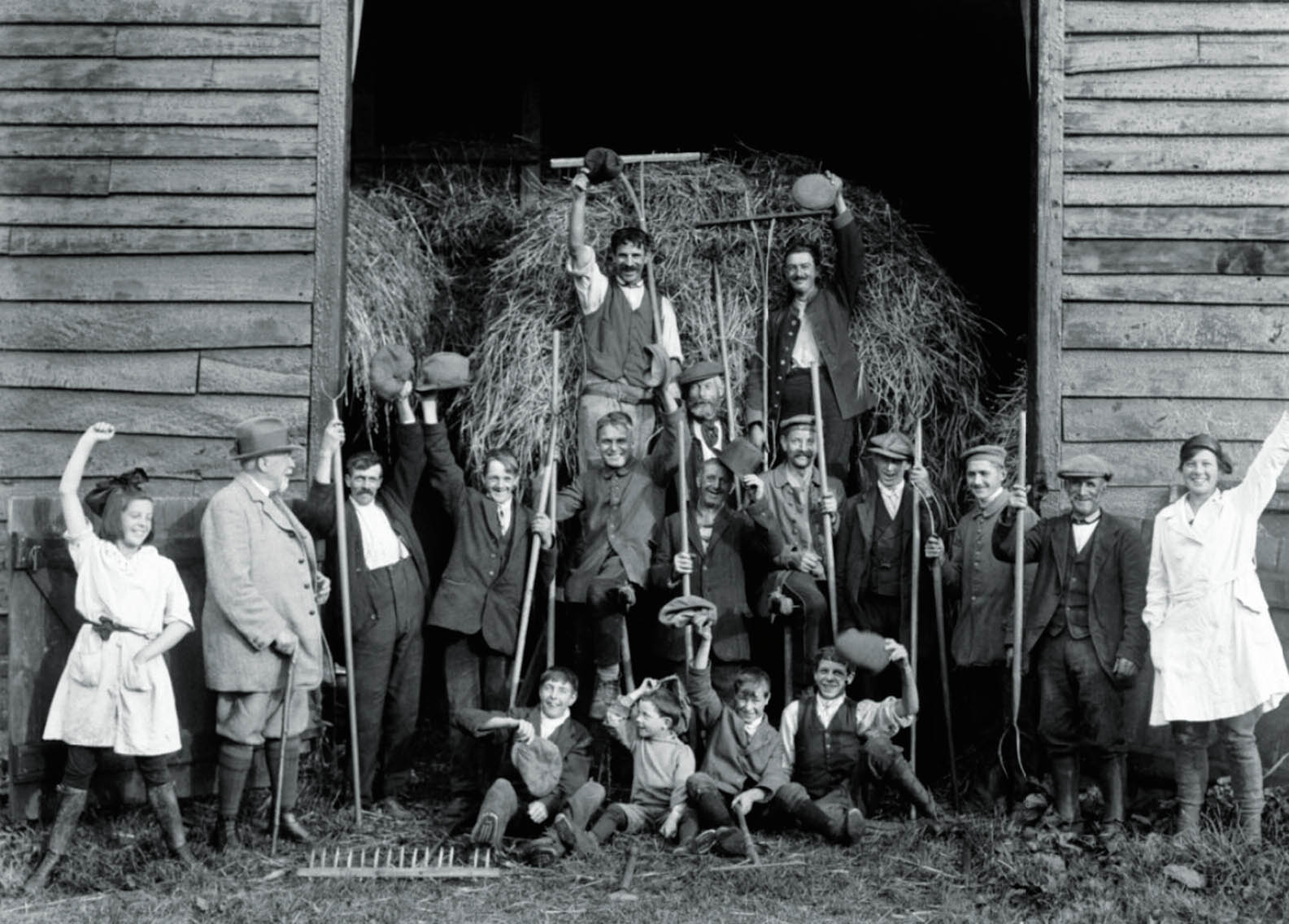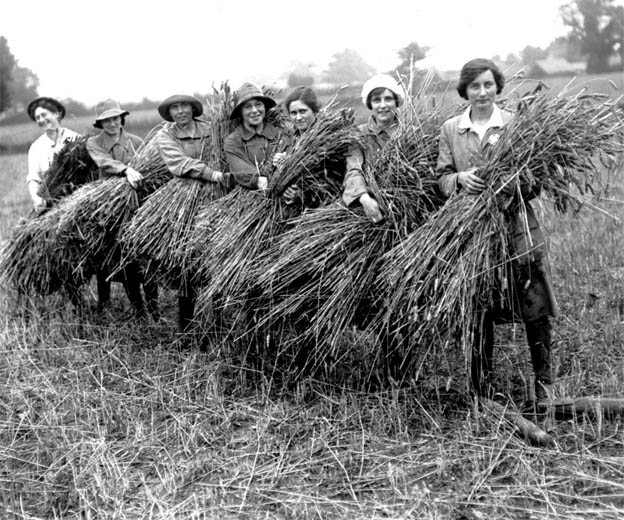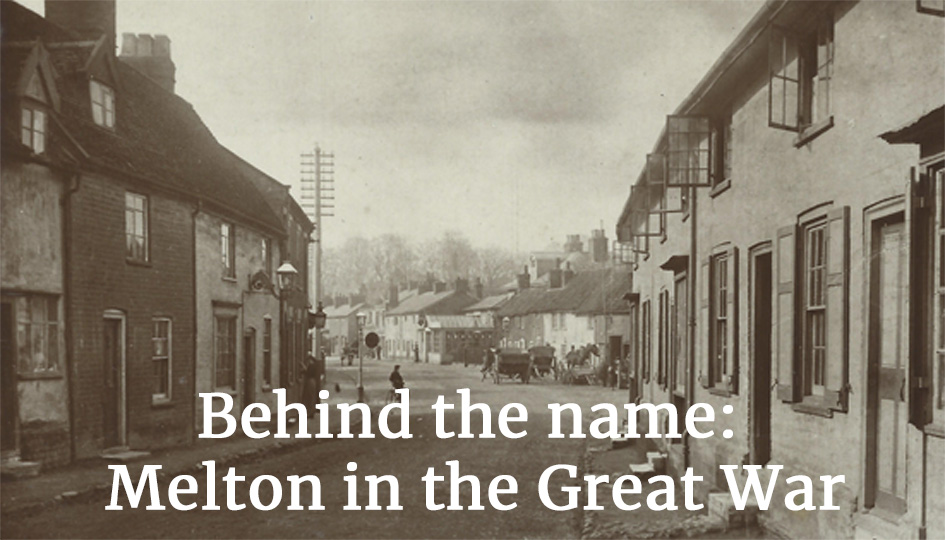At home in Melton during the War Life in the village had to carry on. Each day, more men enlisted, some after attending recruitment meetings in the school. The women and children would now be expected to carry some of the burden of the war effort.
Working the Land
Older schoolboys would take the place of their fathers in the fields during harvest time and their mothers would help as well. Food for the war effort being a priority and not just for the soldiers – their horses also needed to be fed and watered too. In April 1916, a meeting was held in the village school to promote the need for women to work on the land. The Woodbridge Recorder and Wickham Market Gazette reported on 20th April 1916:
Women and children farmworkers in Suffolk during the War. Assisting them are German prisoners of war. 
(IWM Q 31044)
Women on the land / Meeting at Melton / Interesting particulars
A meeting of this movement was held in Melton schoolroom on Friday afternoon April 14th at which Mrs Clement Smith of Walton, Felixstowe who is the district representative for the whole area contained in the Woodbridge Union presided and made a most useful and interesting speech.
As Mrs Clement Smith pointed out there is a shortage of men to make up and it devolves upon the women while their men are offering their lives for their country to sacrifice any objection they may feel to working on the land, to do all they can to help in the production of food. For although we cannot promise to feed all the people yet every ounce of food produced here saves the cost of carriage from some other country. Some farmers seemed dubious as to the capacity of women to do the work, there is ample evidence to show that they can do it. For instance, a Norfolk farmer in a letter to her the classic work that had already been done by the women on the farm alone. They had scrubbed over 100 acres of potatoes clean, planted out 50 acres of cabbages, weeded 500 acres of corn, kept clean 20 acres of mangles [a fodder crop] and 12 acres of sugar beet: they had picked 130 acres of potatoes, chopped thirty acres of turnips, lifted nearly 500 bushels of beet and riddled and put up for market 500 tons of potatoes and spread 200 acres with manure representing 2,000 loads. From November last year to March this year, 18 women had worked regularly in spite of a wet and stormy winter.
She also emphasised the fact that in giving in their names the women don't pledge themselves " but merely give farmers the opportunity of finding them if they want them, when they can go and come as they please.
She mentioned that the Board of Agriculture has entrusted the representatives in each district of distributing armlets to women who have worked not less than thirty days on the land. The work need not be consecutive. Application for an armlet must be made to the registrar of the parish.
Mrs Clement Smith concluded her address by urging all women who could come forward and offer their help and in time to come they would be proud to know that they had done useful work which would be recognised by their country.
Mr Philip Pratt of The Lodge Farm also spoke in support and made some interesting remarks from the farmer's point of view. He said that although Melton was not what could be called an agricultural parish yet the farmers around would appreciate the fact that there would be a centre where they could go and apply to the registrar direct as they had no time to go about each village looking for workers. He believed workers would be required about the middle of May and that the farmers then would be very glad to have help. As to wages, that would be a matter of arrangement but he thought that two shillings a day or threepence an hour would be a fair wage and as to piece-work the pay would probably be the same as for men although he thought women would take longer to do the job. He laid stress on the importance of women who were willing to work on the land being ready to come at short notice as weather and other conditions prevented a farmer from making arrangements far in advance.
Mrs Grant of Melton Grange passed round a very useful clog, or stout shoe suitable for farm work, suitable to those worn in Yorkshire, the cost of which is very much below that of the regulation boot.
The following ladies kindly consented to act as a committee to organize a canvass of willing workers, namely, Mrs Gall, Mrs Garrod, Mrs Orpen and Mrs Sulivan and Miss Margery Murray (of Red Towers) was appointed to act as the village registrar for Melton.
A vote of thanks to Mrs Clement Smith was heartily given for her trouble in kindly presiding and speaking at the meeting.
It was from meetings like this that the Women’s Land Army would emerge in February 1917.
The Women’s Land Army was formed in February 1917. By the end of the war on 1918 over 
113,000 women were members.
SALVAGE - every little helps
As the war dragged on and resources grew ever scarcer, the general public was encouraged to collect waste materials such as paper, rags, scrap metals and rubber which could be recycled and used in the manufacture of munitions. Monies raised from the sale of these items could be given to benefit local charities. Mrs Florence Villiers of Melton Hall undertook the position of honorary secretary of the movement for national salvage locally. During the summer of 1918, over twenty-two tons of waste materials were collected, realising a total of £13.13.00 (£522 today). This amount was divided equally between Suffolk Red Cross Society and Suffolk Prisoners of War Committee. The local press congratulated Mrs Villiers for persevering despite the difficulties and complications involved in making a success of this work.
Food shortages became the norm, with everyone affected having to make the food they had go further. Rural areas were not as hard hit as the towns and cities, where not everyone had access to a piece of land to grow their own vegetables or keep chickens. Villagers, however, were still invited to a lecture and demonstration of “thrifty and pleasant cookery suitable for cottagers” that had been organised by the Ipswich School Committee of the County Council.
